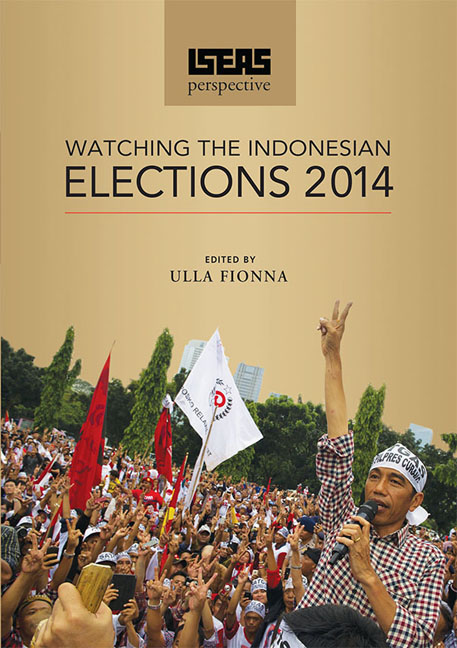Book contents
- Frontmatter
- Contents
- Foreword
- Introduction
- 1 The Gubernatorial Race in Jakarta: Background and Implications
- 2 Indonesian Parties Struggle for Electability
- 3 Who Will Be Indonesian President in 2014?
- 4 Indonesian Presidential Election Forcing Rejuvenation of Parties
- 5 Resisting Democracy: Front Pembela Islam and Indonesia's 2014 Elections
- 6 Getting to Know the Contestants of the 2014 Indonesian Parliamentary Elections
- 7 A Snapshot of the Campaigning in Indonesia's 2014 Legislative Elections
- 8 Unpacking the Results of the 2014 Indonesian Legislative Elections
- 9 Indonesia's 2014 Legislative Elections: The Dilemmas of “Elektabilitas” Politics
- 10 The Islamic Factor in the 2014 Indonesian Elections
- 11 Vote-buying in Indonesia's 2014 Elections: The Other Side of the Coin
- 12 Gap Narrows Between Candidates in Indonesian Presidential Elections
- 13 Analysing the Economic Platforms in the Indonesian Presidential Election
- 14 Indonesian Islamic Parties After the 2014 Elections: Divided and Self-Centred
- 15 Safeguarding Indonesia's Pluralism: An Essential Task for Joko Widodo
- 16 Jokowi's Key Economic Challenge: Improving Fiscal Policy for Equitable Growth
- 17 Crossing the River While Avoiding the Stones: Jokowi's Run-up to the Presidency
- 18 Post-elections Indonesia: Towards a Crisis of Government?
- Epilogue: Jokowi's First Months: Compromise Cabinet, Subsidy Cuts, and Corrupt Coalition
12 - Gap Narrows Between Candidates in Indonesian Presidential Elections
Published online by Cambridge University Press: 29 July 2017
- Frontmatter
- Contents
- Foreword
- Introduction
- 1 The Gubernatorial Race in Jakarta: Background and Implications
- 2 Indonesian Parties Struggle for Electability
- 3 Who Will Be Indonesian President in 2014?
- 4 Indonesian Presidential Election Forcing Rejuvenation of Parties
- 5 Resisting Democracy: Front Pembela Islam and Indonesia's 2014 Elections
- 6 Getting to Know the Contestants of the 2014 Indonesian Parliamentary Elections
- 7 A Snapshot of the Campaigning in Indonesia's 2014 Legislative Elections
- 8 Unpacking the Results of the 2014 Indonesian Legislative Elections
- 9 Indonesia's 2014 Legislative Elections: The Dilemmas of “Elektabilitas” Politics
- 10 The Islamic Factor in the 2014 Indonesian Elections
- 11 Vote-buying in Indonesia's 2014 Elections: The Other Side of the Coin
- 12 Gap Narrows Between Candidates in Indonesian Presidential Elections
- 13 Analysing the Economic Platforms in the Indonesian Presidential Election
- 14 Indonesian Islamic Parties After the 2014 Elections: Divided and Self-Centred
- 15 Safeguarding Indonesia's Pluralism: An Essential Task for Joko Widodo
- 16 Jokowi's Key Economic Challenge: Improving Fiscal Policy for Equitable Growth
- 17 Crossing the River While Avoiding the Stones: Jokowi's Run-up to the Presidency
- 18 Post-elections Indonesia: Towards a Crisis of Government?
- Epilogue: Jokowi's First Months: Compromise Cabinet, Subsidy Cuts, and Corrupt Coalition
Summary
After an extensive pre-campaign lobbying period to form political coalitions, the presidential election campaigning has been ongoing for three weeks. There have been three nationally televised debates between the two candidates (with each debate focusing on a specific topic) and a nationally televised “dialogue” between the presidential candidates and the Indonesian Chamber of Commerce (KADIN). There has been a flurry of activities as the presidential candidates and their spokespersons immersed themselves in campaigning; billboards and advertising are everywhere.
It has become fairly clear what the division within the Indonesian elite is about. The two candidates, Joko Widodo (from PDI-P) and Prabowo Subianto (from GERINDRA), represent two quite different paths into the future (or back to the past) for Indonesia, but both emerge from within the Indonesian ruling elite. Widodo harks from the new regional elite that blossomed with Indonesia's experiment with decentralization. Prabowo is very much tied to the old elite of the New Order and, while very wealthy in his own right, is also the brother of an extremely wealthy businessman. He is a former son-in-law of Suharto and the son of a former Suharto minister, who is also a wealthy businessman. At the moment, most polls put Widodo between 5 per cent and 7 per cent ahead of Prabowo, with between 20–30 per cent still undecided. Widodo, although still ahead in the polls, appears to have lost the massive lead he had earlier in the year, when some polls had him at 70 per cent.
The “visions” offered by the two candidates reflect the main division within the Indonesian capitalist class. There are the large conglomerates aspiring to restore their crony status, represented by Prabowo and Aburizal Bakrie (Golkar chairman) and there is the ocean of kabupaten (regency) and provincial capitalists, represented by Widodo and Jusuf Kalla, who make up the bulk of the elites of local branches of political parties throughout the country. Since 2000, kabupaten and provincial capitalists have had more space for intervention in politics as a result of the direct election of regional leaders such as bupatis (regents), mayors and governors and more budgetary power for local parliaments.
- Type
- Chapter
- Information
- ISEAS PerspectiveWatching the Indonesian Elections 2014, pp. 103 - 113Publisher: ISEAS–Yusof Ishak InstitutePrint publication year: 2015



